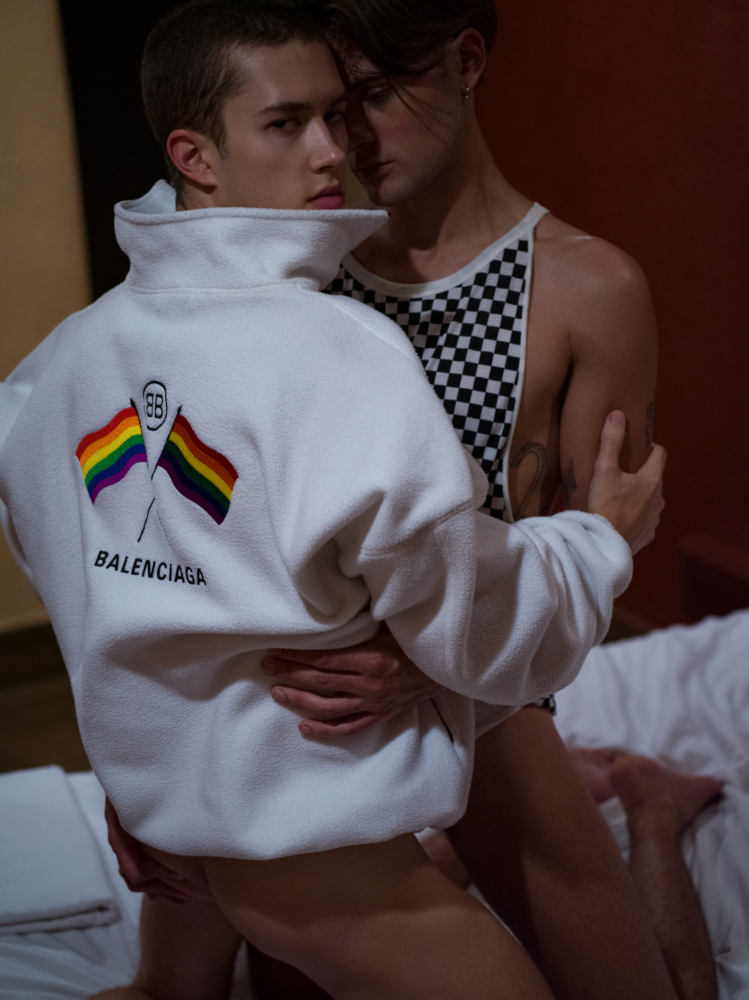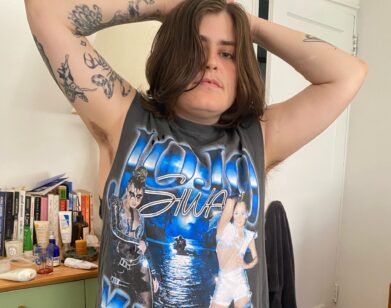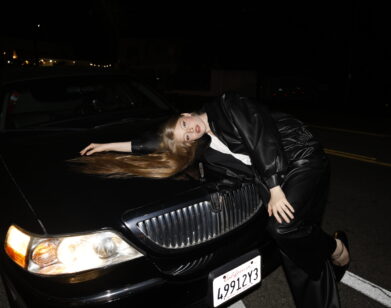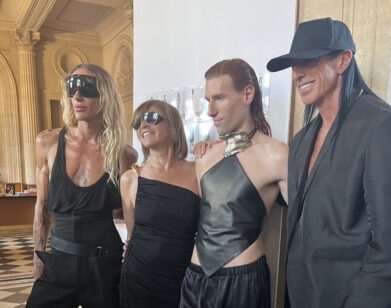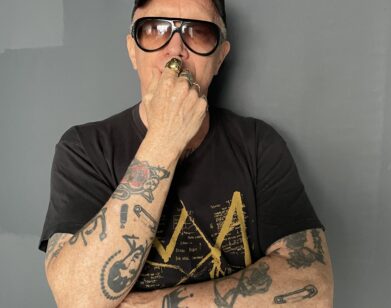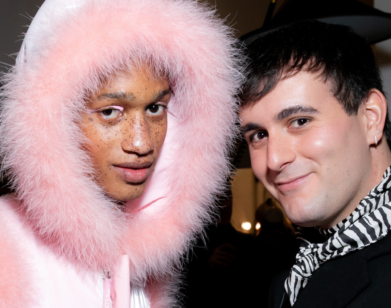Adult Film Star Sean Ford Wants to Make Intimacy Sexy Again
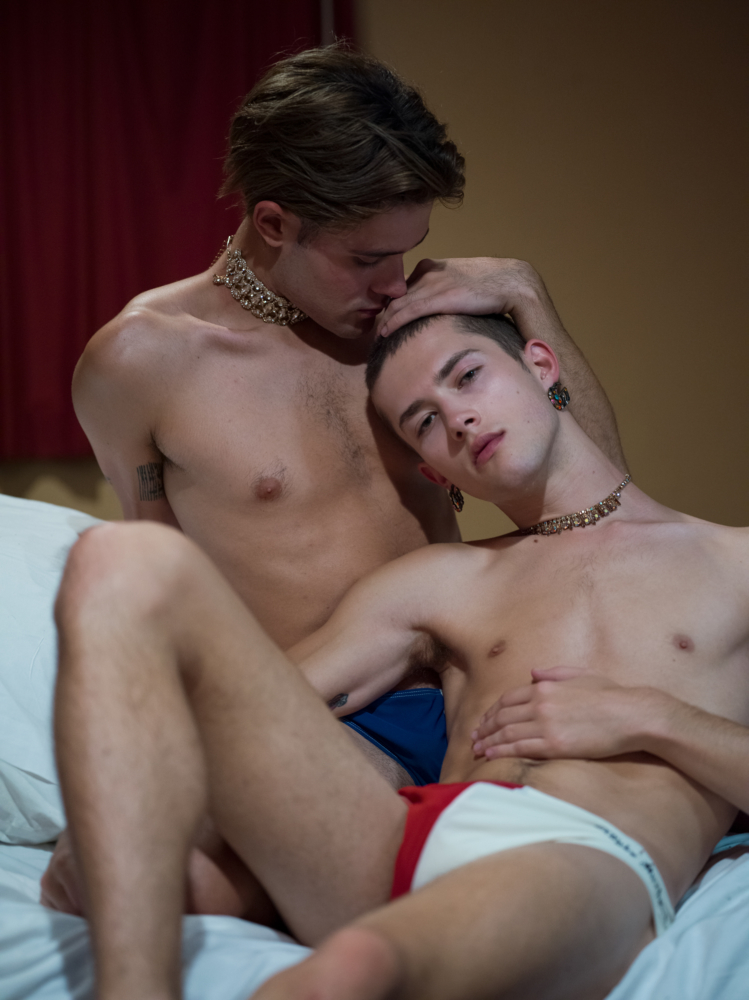
Briefs by Linder NYC. Earrings by Gucci. Necklaces by G. Sherman Jewels.
For many, the word intimacy may have close ties to the erotic, but in mainstream representations of queer sex, intimacy—and the deep familiarity it engenders—is largely absent. For Sean Ford, a 23 year-old gay porn star and New York transplant from Little Rock, Arkansas, intimacy is about eroticism, love, and openness. Through his work, he hopes to celebrate and normalize “the image of gay love and intimacy as more of a public sphere.” He’s been part of the adult film industry for roughly three years and has since appeared in over 40 scenes. Ford currently works with CockyBoys, a New York-based gay porn studio known for producing gay films infused with experimental arthouse erotica.
Ford—also an up-and-coming fashion darling who has worked with Palomo Spain and starred in a short film for Ludovic de Saint Sernin‘s sex toy line—is eager to change people’s perception of pornography. The young star hopes that people use his explicit work and art—like these photographs of Ford and his boyfriend, the photographer Ben Chabanon, by David Macke and styled by Dylan Wayne—as a way to explore different forms of desire and see the beauty of queer intimacy. During the first week of the new decade, Ford sat down with the New York art-world luminary and author of the recently released I’ve Seen the Future and I’m Not Going Peter McGough to discuss what’s to come for the queer community and the world at large: the normalization of violence, the death of eroticism, and reclaiming the word “faggot.” — ERNEST MACIAS
———
PETER MCGOUGH: Do you do fashion modeling? I mean, you do have the face for it.
SEAN FORD: I’ve done some fashion-facing stuff, some photo shoots for magazines. My boyfriend coincidentally is a photographer. He shot me for some publications. I appreciate the art.
MCGOUGH: That’s what happened when I photographed Jeff Stryker, the biggest porn star of the 80s. I photographed him for Interview and then got into the fashion world. You know, it’s interesting. With pornography or adult film, everybody looks at them, but then they kind of feel it’s a secret thing. Do people give you a different attitude, do they look at you, like you’re less than?
FORD: Sure. I think pornography sometimes, to a lot of people, feels like a disposable one-off art form. It’s meant to be enjoyed on a very…
MCGOUGH: Base level.
FORD: Exactly. I think that does tend to harm people’s view, whether subconsciously or consciously, of the actual performers who are human and are creating the thing that’s actually quite vital for a lot of people, for their enjoyment. A lot of people, even before I tell them, they say, “Have I met you somewhere?” You notice a change before and after you tell them that you’ve done porn, because you’re talking to them. They’re like, “You’re really familiar.” They realize once you’ve told them that you do porn that they’ve, you know…
MCGOUGH: They have seen you?
FORD: … indulged in it. Then it becomes a different sort of dynamic with people. It’s very interesting.
MCGOUGH: These pictures with your partner, is this different than with somebody you’re performing for?
FORD: I think there’s room for a lot of different kinds of queer art. Eroticism without love, I think, has its place, and I’ve certainly worked with people that make that kind of art and I think it’s valuable, but I also like to work with artists who celebrate intimacy, love, and eroticism in a different way. I think, as far as the pictures that Benjamin and I did with David, it’s about showcasing that this love is real love and that’s beautiful.
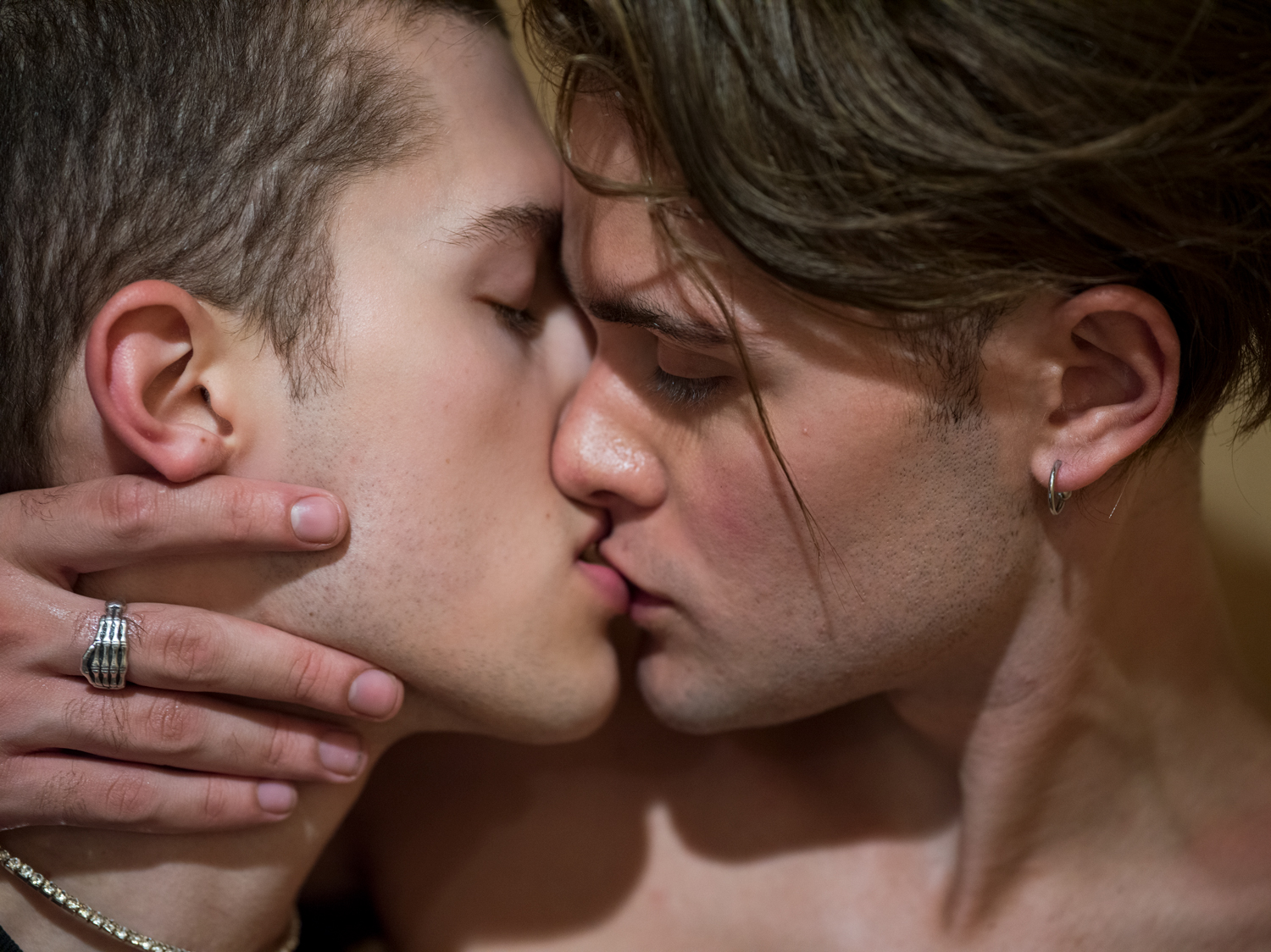
Sean (left) wears Necklace by G. Sherman Jewels. Ring Ben’s own.
MCGOUGH: What’s the importance of making work that highlights queer love? How do you see yourself as a spokesman? I feel like you have a different attitude towards it. Tell me more about that.
FORD: I believe that queer love shouldn’t only exist in the narrow scope of porn. I’ve been trying to push it onto others, working with fashion designers who also appreciate sexuality and don’t try to hide from it. I think, in that regard, pushing the idea and image of gay love and intimacy as more of a public sphere and not so much as the disposable thing that porn tends to construe it as.
MCGOUGH: It still has a lot of shame base to it, even though most men watch porn—straight and gay and bi. But it does have kind of a dirty, hidden feeling. When I was your age, maybe two years older, I made this painting in 1985 that said “queer.” Big Victorian letters and flowers all around it. I thought, I’m for that, because “queer” meant odd. I had been called that since I was a kid, being shouted from passing cars and whatever. I’d been told it’s considered radical now, but when I did it, I just thought, “Why did that have to be such a bad word?”
FORD: Right.
MCGOUGH: Now it’s queer cinema, queer politics and all that. I think that what you’re doing here is you’re experimenting with what they would call nudies, porno, or dirty pictures, and you’re trying to bring it into, “No, this is queer love.” It’s really a straight world. Even our government, they’re trying to take away LGBT rights. So I think it’s interesting what you’re doing here. You’re promoting intimacy and love between two men.
FORD: Because some people don’t get to experience it. Some people living in small towns and in the middle of the country, if this is the first time that they’ve seen this or at least seen it in this way, I think it can change their perspective on their own lives and their own possibilities. Perhaps give them some kind of hope that when what they figure out what they want in life—sexually or romantically—it isn’t shameful.
MCGOUGH: [Andy] Warhol made a movie called Blue Movie and his Blowjob screencast is infamous. It’s a weird thing about sex … that’s how we all got here. It’s part of enjoyment. It’s part of love. It’s part of some kind of DNA pushing you to reproduce. You’re showing that sex between two men is a loving thing. It can be beautiful, like in the picture of a kiss. There is nothing shameful about it. I mean, what is shameful? Eating a baby, maybe? Being horribly cruel, murder, torture—all that. That, to me, is shameful. It’s like Jack Nicholson said when they had that movie The Devil and Miss Jones. He was being tried for pornography and was like, you know, “Flash a breast and you get an R rating. Kiss it and you get an X.” Violence is so shocking to me. I mean, I think it has gotten out of hand in cinema. You see all these guns on posters, all of these pictures of women holding guns, men holding guns, and then you have gun violence all over America. They are promoting violence. Why not promote intimacy, love, and pleasure?
FORD: Violence has become so much more normalized than eroticism. I think it’s for actually quite an intentional, sinister reason. It’s because violence tends to push people apart for the benefit of the powerful. Love, radical love, tends to bring people together and can affect real change. I think the promotion and normalization of violence over love and eroticism has been an intentional move by the powerful to sort of drive us away from each other.
MCGOUGH: That’s right. To control people, you’ve got to keep them afraid.
FORD: We live in such an anxiety-ridden society, whether economically, socially, or now environmentally. People have such anxiety about everything that I think they tend to turn to those violent escapes as a relief from their anxiety and stress. But what I think they don’t know, or maybe are even not taught to believe, is that there are healthier ways to cope with their anxiety, like sexually, rather than indulge in things that are going to make it worse.
MCGOUGH: You know, human beings, I’ve read, can experience misery easier than they can experience joy. I think too much joy for people makes them nervous because they’re not used to it. I think that people are getting used to that: letting the joy of life, the joy of intimacy, in. You’re in this adult industry at such a young age. Does your family know?
FORD: Actually, my mother knows what I do and she’s very supportive. I can talk to her about it.
MCGOUGH: Why do you think she’s so supportive of you in this?
FORD: She trusts me and she thinks I’m smart, which sometimes I doubt. She also, you know, grew up part of a hippie commune in the woods of Arkansas, so I think that probably had something to do with her liberal mentality.
MCGOUGH: Well, that does help.
FORD: It was like an odd place for hippies in the middle of the woods, basically. She has really interesting stories about that. She’s amazing.
MCGOUGH: There are so many beautiful books, all these early homoerotic writers—Gore Vidal, James Baldwin. They were writing gay novels. Baldwin’s Giovanni’s Room is about the relationship between a straight man and a young gay man. You have Other Voices, Other Rooms from [Truman] Capote. Vidal’s The City and the Pillar, which is an outright story. In 1947, the New York Times banned ever mentioning him for five years. Certain artists—we call them queer artists now—took the lead, whether it was in painting or sculpture or the written word. Paul Cadmus, who made these very homoerotic paintings, painted for the WPA. The Navy commissioned a big painting, but it was so homoerotic, they wouldn’t show it.
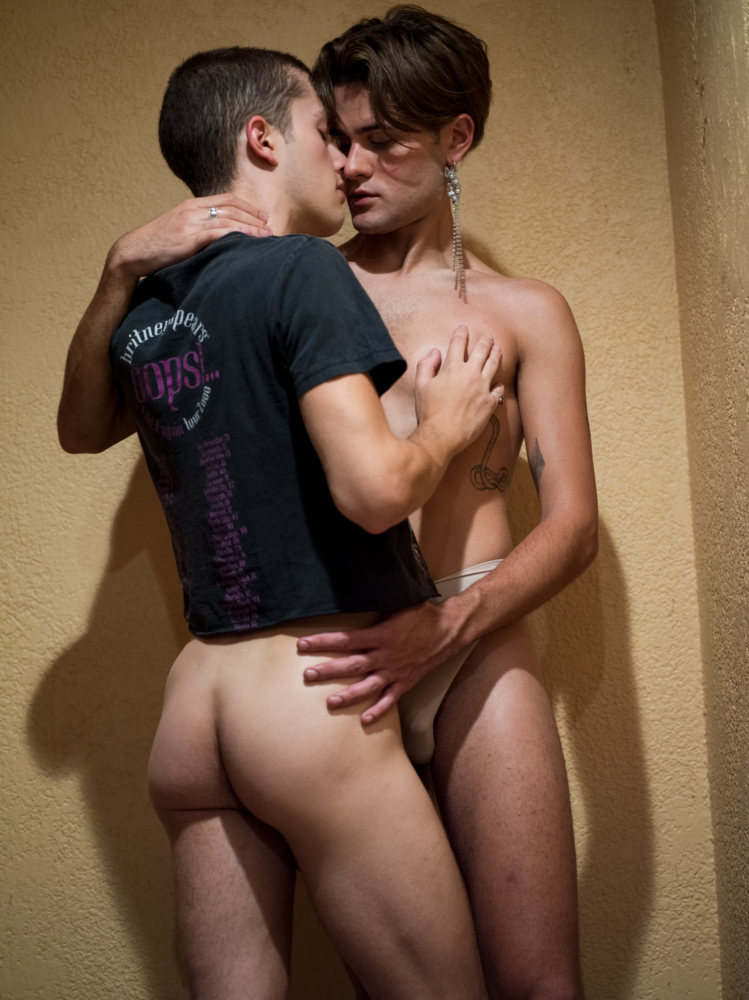
Earring by G. Sherman Jewels.
FORD: You know, I think about the titans of… well, we call them queer artists now, like you said. I don’t know if they were necessarily self-aware to call themselves queer then. I mean, that was a word that took on a new meaning. I think about all the writers and painters that really pushed things forward, I wish they could see the generation coming up now, because I think they’d be very pleased by the attitudes of the generation. I don’t know what the future will hold politically and environmentally. We’re sort of heading towards really dangerous times, but I think maybe towards the end or towards this new rebirth of human civilization, it might start to click. People might start to see what these artists were saying one hundred years ago.
MCGOUGH: I remember when I was 16, I was watching Dick Cavett, who was an interviewer in the ’70s. He had Christopher Isherwood, who wrote Berlin Stories that became Cabaret. Cavett said, “Well, you’re gay.” Christopher Isherwood said, “Oh, I hate that word.” And Cavett asked him, “Well, what do you want me to call it?” He said, “Call me a queer.” In the mid-’70s, that stuck with me. I learned from an old queer, and then I thought, if he’s saying it in the ’80s, I was thinking, “Oh, why not make a painting that says queer?” Because I wanted to be called queer. Now, I see all these people saying “faggot.” I love that kind of thing—“the faggotry.”
FORD: I feel like we’ve reclaimed that word, faggot. It feels really good to say.
———
- Sean wears Fleece by Balenciaga. Ben wears Tank by Dior.
- Sean wears Fleece by Balenciaga. Ben wears Tank by Dior.


